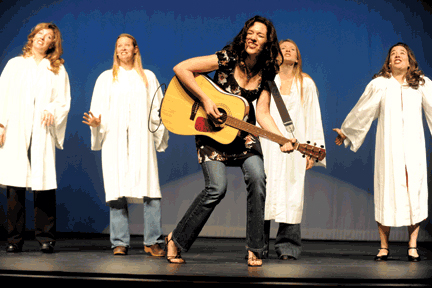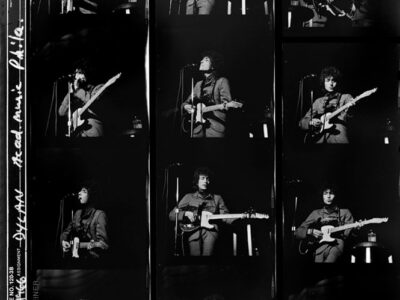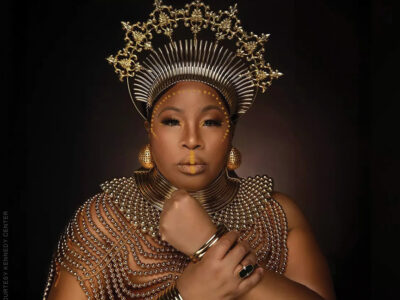
Class of ’90 and ’92 | A tall woman stands on stage in a black T-shirt and ripped jeans, singing and playing a guitar. She’s flanked by two singers in jeans and black satin tops. The tune is a folksy ballad that sounds like something Wilson Phillips might have cooked up, with a dash of Spice Girls.
“In 1996, in the Journal of Abnormal Psychology,” the singers croon, “they measured a bunch of guys’ weenies while they watched porn on TV.” The women are in fact harmonizing about a study that found that homophobic men were twice as likely to be aroused by pornography featuring two men than were non-homophobic straight men.
The song, which by early April had gone semi-viral, is titled “Probably Gay.” Its refrain: “Yes, I’m sorry to be the one that has to say,/ If you’re homophobic, you’re pro-ba-bly gay!”

If the notion of a peer-reviewed journal informing a folk song strikes you as odd, chances are you’ve never seen Katie Goodman C’90 perform. Goodman and her husband, Soren Kisiel C’92, are the team behind Broad Comedy, a self-proclaimed liberal, feminist troupe that performs such musical acts as “Soccer Mom Ho” and “Glenn Beck is Batshit Crazy.”
Goodman headlines the shows and the performers are all female, yet Kisiel is very much involved offstage. The spouses collaborate in writing all the numbers and running the show.
“Soren will go, ‘I want you to write this song I’m thinking of. Can you whip up something that’s Beastie Boys meets Beyoncé?’” says Goodman, who does the composing. If she’s confused, he’ll clarify: “Beastie Boys in the nineties.”
Together, they’ve built Broad Comedy and produced Goodman’s solo album and show. Working as a team is one of the perks of the job, they say.
“I think we’re actually happier as a couple when we’re working together because we have a common goal that isn’t just diapers,” says Goodman. “Hopefully we’ll be together long enough that we’re helping each other with our diapers.”
That said, there are some rules. The most important: “No talking about work in bed.”
Now and then, Kisiel makes a cameo appearance in one of the performances. He joined Goodman in her rap video for “Baby, You Forty,” a song about the pleasures of perimenopause, including night sweats, snorting in one’s sleep, and ingesting black cohosh.
If it’s unusual for a man to write lyrics for a comedy troupe committed to making space for women’s voices, to Kisiel and Goodman it makes perfect sense.
“What feminism has meant to us has been challenging the culture of gender inequality,” says Kisiel. “Just simply that. It seems it has come to mean to a lot of other people man-hating or angry.”
Recalling a feminist reporter in Scotland who urged the pair not to call themselves feminist because people might associate the term with “angry, Birkenstock-wearing lesbians,” Kisiel explains: “We certainly don’t have anything against angry, Birkenstock-wearing lesbians, but that doesn’t describe our show very well.”
“We wear a lot of skimpy stuff,” Goodman adds. “We’re happily combating the idea that feminism is anti-sexual.”
Goodman and Kisiel see questioning as the role of art, although Kisiel hastens to clarify that by noting: “We both have an inclination not to take ourselves too seriously.”
Take “Hummer,” for example. A country-music riff about a woman who used to worry about saving the planet but now just wants a man with a really large car, the song at once critiques an absurdly large vehicle and jokes about people obsessed with their carbon footprints.
“One of the things I get excited about is when we have conservative fans who are like, ‘I love what you’re doing; I don’t agree with a lot of it, but you’re not taking any cheap shots,’” says Goodman. Of course, she concedes, “We do take some cheap shots. But you don’t want to preach to the converted all day long.”
Besides, she adds: “It’s not even preaching to the converted; it’s helping the converted laugh and release and find a community of 750 people all laughing at the same thing.”
Having performed a number of times for a certain national women’s organization that doesn’t want its name used, Goodman says, “those are the people on the ground—they need energy, and then they get energy back” by laughing together at the show. She’s now developing a national college tour for them.
Goodman has been on The Green Room with Paul Provenza (C’79), and speaks at the Omega Institute about using the tools of improv comedy in everyday life—which is also the subject of her book, Improvisation for the Spirit.
Yet, with all those opportunities, she can’t help gushing about the time her comedic hero, actress Kathy Najimy, came to her show in New York. Goodman brought Najimy up on stage and announced, “This woman is why I’m doing feminist comedy today.”
“After the show, I texted my girlfriends from 20 years ago from the Women’s Theater Festival at Penn,” she recalls, referring to the program she ran for a couple of years as an undergraduate. “Kathy loved my show so much, and I definitely felt like, ‘I’m a fucking adult. I know what I’m doing now. I don’t have anything to prove. I’m in charge of my life, and I’m saying exactly what I want to be saying. Nobody’s not letting me say it.’”
And every now and then, saying exactly what she wants to be saying means that Goodman finds herself on stage in front of 700 people, singing about the Journal of Abnormal Psychology.
—Emily Rosenbaum C’95 GEd’96




